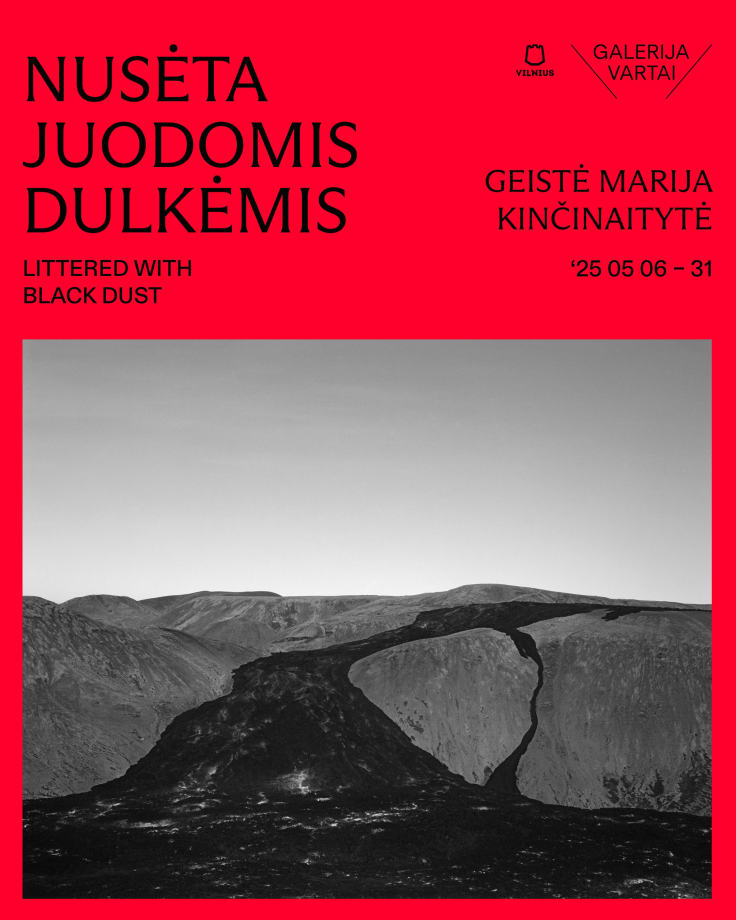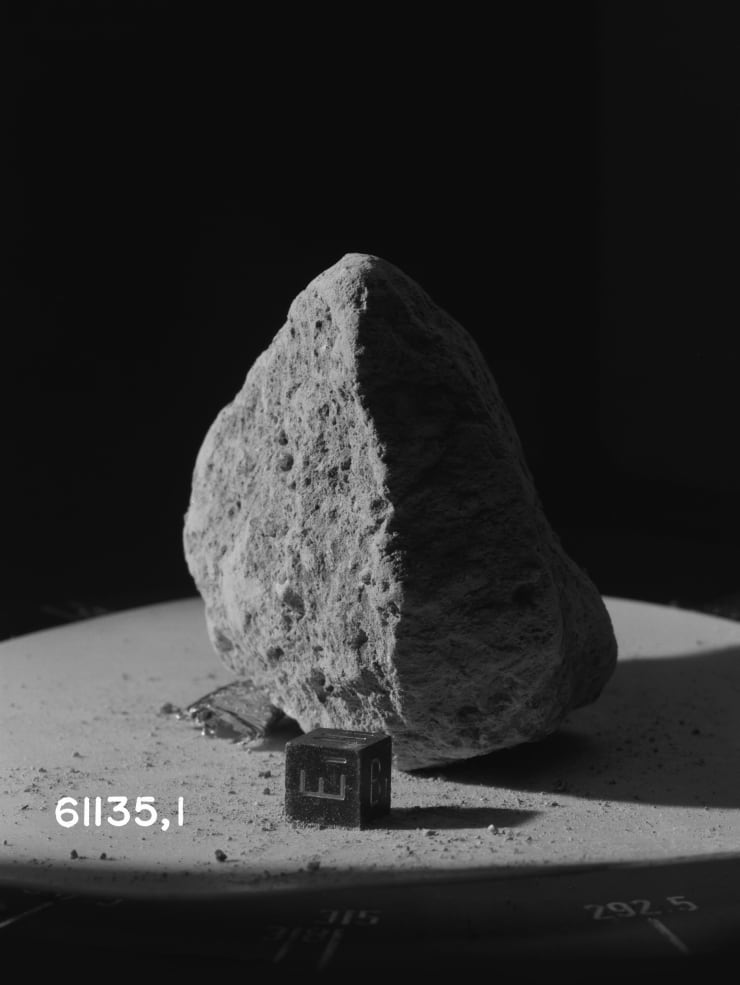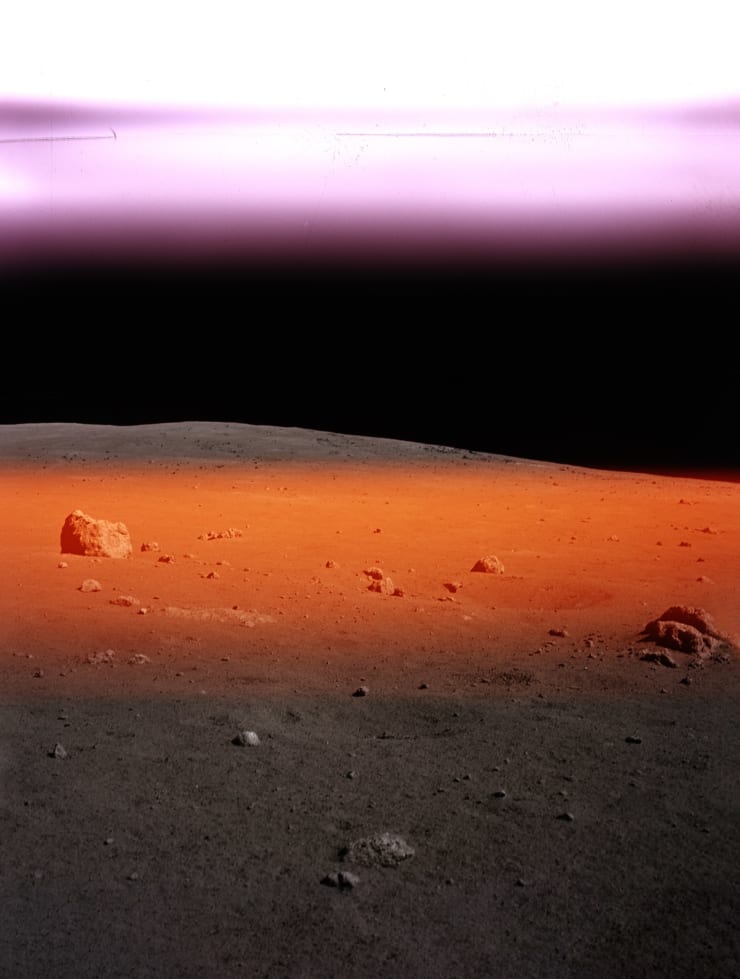Geistė Marija Kinčinaitytė’s solo exhibition Littered with Black Dust
06.05.2025 – 31.05.2025
Through stories, images, maps, and speculations, the Moon became a place before we stepped on its surface. Since the late 1960s, it has also become a destination. Scientists studying planetary bodies transform these distant
objects into
places. Anthropologist Lisa Messeri calls this planetary ‘place-making’
1: the process of narrating, visualising, mapping, and imagining them as habitable, either by humans or more-than-humans. The vastness of the cosmos becomes a stage for aspiration, scaled to the human experience and desire.
In Littered with Black Dust, Geistė Marija Kinčinaitytė exposes and reframes the act of ‘placing outer space’. Using photography, moving image, and post-photographic archives, the exhibition traces and speculates on how scientific infrastructures and imaging technologies have rendered the Moon intelligible. These works also interrogate the techno-utopian logics that frame it as a site of extraction. Cold, airless, and uninhabitable (for now), the Moon shifts from alien to familiar, creating a fleeting sense of intimacy, only to return us – again – to the eerie and unreachable.
Archival photographs from the US Apollo missions from 1961 to 1972 are reproduced and reframed. In
Untitled (Sample 10048) and
Untitled (Sample 61135), lunar fragments appear staged for documentation, transforming what was once a landscape into a data sample. As Estelle Blaschke and Armin Linke observe
2, the evolution of photography as an information technology shaped scientific ideals of objectivity and truth. Kinčinaitytė’s re-enactments resist this evidentiary logic. They slow the gaze and reveal these images as operational tools within infrastructures of planetary governance.
Kinčinaitytė’s landscape photography becomes a site of slippage between Earth and Moon. In the series Untitled (2023–2025) and Untitled (1972–2025), soon-to-be-landed lunar scenes coexist with Icelandic lava fields and geothermal terrains. These sites have long served as stand-ins for planetary research. Apollo astronauts trained in the region around Askja, Iceland, and today, the same sites support habitat simulations and equipment testing for future extraterrestrial missions.
Drawing on the scientific logic of analogue fieldwork, these images invite disorientation and speculation. Amid the black basalt, one might half-believe they have arrived on the Moon, just as scientists have claimed at sites like the Mars Desert Research Station.
3 This ‘double exposure’ of Moon and Earth, as Messeri argues, becomes a juxtaposition of time and place: the landscapes appear both earthly and otherworldly, projecting imagined lunar futures onto present-day terrains.
This doubling culminates in the sculptural video installation Layers of Ashes (For Isabelle) (2025). Anchored in place, the camera pans in circular sweeps across Icelandic sites, as if tracing the view of someone newly landed, but never quite arriving. Volcanic strata, crashing oceans, and fractured ice flicker between presence and disappearance. Shot on Super 8, the film resists the clarity and authority of digital resolution. Its grainy texture, intermittently washed in red atmospheres and paired with an eerie soundscape, heightens its disorientation. There is no walking into the landscape; no momentum of exploration. Only observational drift across a horizonless expanse. The film unfolds as a hauntological record of an explorer who never appears, suspended in a double exposure of Moon and Earth.
In the age of the New Space Race, Littered with Black Dust proposes a critical counter-imaginary. Kinčinaitytė’s works probe the instruments, failures, and longings embedded in the images that shape our planetary imagination. The Moon, covered in regolith, emerges as an epistemic surface, speculative terrain, and site of extractive desire. In its flickering exposures and unsettled geographies, the Earth rehearses the lunar, and perception gives way to doubt. In this dust, we might find a space to resist the techno-utopian fantasies that propel planetary futures.
Text written by Ana Prendes.
1 Lisa Messeri, Placing Outer Space: An Earthly Ethnography of Other Worlds (Durham: Duke University Press, 2016).
3 Lisa Messeri, Placing Outer Space: An Earthly Ethnography of Other Worlds (Durham: Duke University Press, 2016).




















